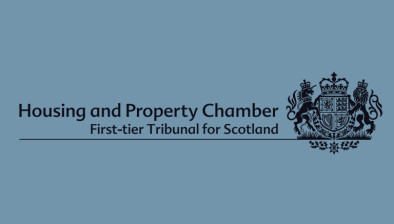Edinburgh tenant wins breach of statutory obligations appeal after reconsideration by Upper Tribunal
The Upper Tribunal for Scotland has allowed an appeal by the former co-tenant of a flat in Edinburgh after it was ordered to reconsider her case by the Court of Session.

Kate Affleck, the appellant, was one of four tenants of a flat owned by the respondents, Chris and Sarah Bronsdon. She originally applied to the First-tier Tribunal for Scotland (Housing and Property Chamber) for a determination that her landlords were in breach of their statutory obligations.
The appeal was heard by Sheriff Pino Di Emidio.
Access to common parts
The appellant moved into a flat on Forrest Road in Edinburgh owned by the respondents in January 2018. The terms of the lease entitled her to a private bedroom as well as access to common areas, including a kitchen, living room, and bathroom, shared with three other tenants who each had a separate agreement with the respondents. The duration of the lease was not agreed, and the appellant was not provided with a set of written terms.
In October 2018, a dispute arose when it became apparent that the respondents believed all four tenants to be jointly and severally liable for each other’s rent. This had not been mentioned in any previous correspondence between the appellant and respondents.
The respondents drafted five separate tenancy agreements for the appellant to sign, four of which attempted to impose joint and several liability. The appellant signed none of them. The appellant made an application to the First-tier Tribunal for Scotland for a determination that the respondents had breached their obligation to provide her with the written terms of her tenancy under section 14 of the Private Housing (Tenancies) (Scotland) Act 2016.
The FtT concluded that the parties had not reached an agreement that created a tenancy. On appeal to the Upper Tribunal, Sheriff Nigel Ross concluded that the FtT had erred in making this conclusion. However, he found the tenancy was not capable of being a private residential tenancy (PRT) under the 2016 Act and therefore the application still failed.
The UT decision was quashed without a hearing after the appellant brought the case to the Court of Session. By this time, it had been accepted that the terms of section 2 of the 2016 Act had been overlooked. The matter was remitted back to the UT and assigned to a different judge, Sheriff Di Emidio.
In her additional submissions, the appellant argued that the terms of section 2(4) of the 2016 Act, which allow for lets including access to common parts of a property to be regarded as separate dwellings, were relevant to her tenancy and meant the agreement should be considered a PRT.
A separate dwelling
In his decision, Sheriff Di Emidio repeated the finding of Sheriff Ross that a tenancy agreement existed between the parties. He said: “The terms of the parties’ agreement are capable of amounting to a lease. The three principal elements as to parties, subjects and rent were agreed in this case as at the date the appellant moved in. The FtT erred in finding otherwise.”
He continued: “There was a later limited adjustment of the contract when some months later the appellant moved to occupy exclusively a different room in the flat after another resident moved out but that is not significant for present purposes. It follows that the respondents’ continued insistence that there was not a lease with a stand-alone tenant is rejected as wrong in fact and law.”
Considering the relevant terms of the 2016 Act to determine whether the tenancy was a PRT, he said: “The main purpose of the contract was to provide the appellant with a home. The subjects of the lease include both the exclusive occupation of a room in the flat but also the shared use of a kitchen, living room and bathroom. This is shared accommodation within the meaning of section 2(4) of the 2016 Act. The subjects of the lease can properly be regarded as a separate dwelling for the purposes of section 2. Therefore the statutory conditions for a PRT are met in this case.”
Unprincipled and exploitative
Moving to remake the decision of the FtT, Sheriff Di Emidio said: “The approach taken by the respondents was a deliberate attempt to impose conditions that were oppressive in their terms and which related to a matter (joint and several liability) which was not discussed between the parties prior to the conclusion of the PRT contract. All five sets of written terms proffered to the FtT failed to reflect the terms that the parties had agreed when they entered into the PRT. There is no reasonable excuse for the way that the respondents dealt with their obligation under section 10.”
Sheriff Di Emidio concluded: “It is unprincipled and exploitative for a landlord to force a tenant, for no other reason than that they share a living space, to pay the rent of non-paying third party co-tenants. The respondents accepted before the FtT that they maintained a lax regime. Their laxity has led to the problems deal with in this case.”
For these reasons, Sheriff Di Emidio allowed the appeal and awarded the appellant the sum of two months’ rent.








